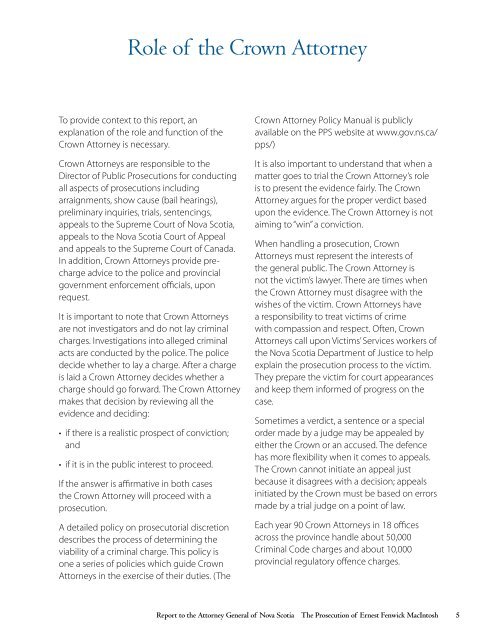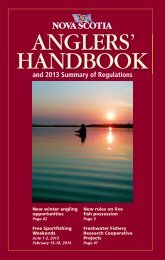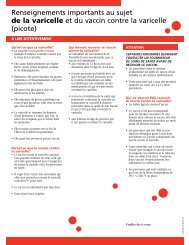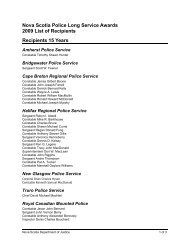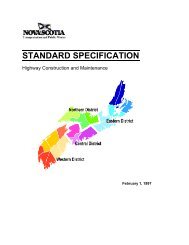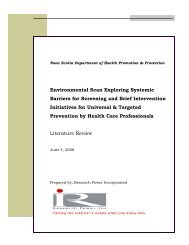The Prosecution of Ernest Fenwick MacIntosh July 10
The Prosecution of Ernest Fenwick MacIntosh July 10
The Prosecution of Ernest Fenwick MacIntosh July 10
You also want an ePaper? Increase the reach of your titles
YUMPU automatically turns print PDFs into web optimized ePapers that Google loves.
Role <strong>of</strong> the Crown AttorneyTo provide context to this report, anexplanation <strong>of</strong> the role and function <strong>of</strong> theCrown Attorney is necessary.Crown Attorneys are responsible to theDirector <strong>of</strong> Public <strong>Prosecution</strong>s for conductingall aspects <strong>of</strong> prosecutions includingarraignments, show cause (bail hearings),preliminary inquiries, trials, sentencings,appeals to the Supreme Court <strong>of</strong> Nova Scotia,appeals to the Nova Scotia Court <strong>of</strong> Appealand appeals to the Supreme Court <strong>of</strong> Canada.In addition, Crown Attorneys provide prechargeadvice to the police and provincialgovernment enforcement <strong>of</strong>ficials, uponrequest.It is important to note that Crown Attorneysare not investigators and do not lay criminalcharges. Investigations into alleged criminalacts are conducted by the police. <strong>The</strong> policedecide whether to lay a charge. After a chargeis laid a Crown Attorney decides whether acharge should go forward. <strong>The</strong> Crown Attorneymakes that decision by reviewing all theevidence and deciding:• if there is a realistic prospect <strong>of</strong> conviction;and• if it is in the public interest to proceed.If the answer is affirmative in both casesthe Crown Attorney will proceed with aprosecution.A detailed policy on prosecutorial discretiondescribes the process <strong>of</strong> determining theviability <strong>of</strong> a criminal charge. This policy isone a series <strong>of</strong> policies which guide CrownAttorneys in the exercise <strong>of</strong> their duties. (<strong>The</strong>Crown Attorney Policy Manual is publiclyavailable on the PPS website at www.gov.ns.ca/pps/)It is also important to understand that when amatter goes to trial the Crown Attorney’s roleis to present the evidence fairly. <strong>The</strong> CrownAttorney argues for the proper verdict basedupon the evidence. <strong>The</strong> Crown Attorney is notaiming to “win” a conviction.When handling a prosecution, CrownAttorneys must represent the interests <strong>of</strong>the general public. <strong>The</strong> Crown Attorney isnot the victim’s lawyer. <strong>The</strong>re are times whenthe Crown Attorney must disagree with thewishes <strong>of</strong> the victim. Crown Attorneys havea responsibility to treat victims <strong>of</strong> crimewith compassion and respect. Often, CrownAttorneys call upon Victims’ Services workers <strong>of</strong>the Nova Scotia Department <strong>of</strong> Justice to helpexplain the prosecution process to the victim.<strong>The</strong>y prepare the victim for court appearancesand keep them informed <strong>of</strong> progress on thecase.Sometimes a verdict, a sentence or a specialorder made by a judge may be appealed byeither the Crown or an accused. <strong>The</strong> defencehas more flexibility when it comes to appeals.<strong>The</strong> Crown cannot initiate an appeal justbecause it disagrees with a decision; appealsinitiated by the Crown must be based on errorsmade by a trial judge on a point <strong>of</strong> law.Each year 90 Crown Attorneys in 18 <strong>of</strong>ficesacross the province handle about 50,000Criminal Code charges and about <strong>10</strong>,000provincial regulatory <strong>of</strong>fence charges.Report to the Attorney General <strong>of</strong> Nova Scotia <strong>The</strong> <strong>Prosecution</strong> <strong>of</strong> <strong>Ernest</strong> <strong>Fenwick</strong> <strong>MacIntosh</strong> 5


